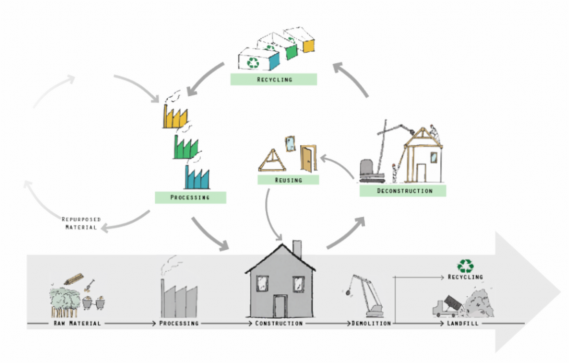Muskegon Feasibility Study
By: Hafsa Khan, MSU CCED, Research Assistant, khanhafs@msu.edu

MSU Center for Community and Economic Development (MSU CCED), in partnership with the West Michigan Shoreline Regional Development Commission (WMSRDC), recently finished a study, concluding there may be potential for creating a sustainable, deconstruction-based economy in west Michigan. With over three million abandoned homes, the Midwest struggles with the compounding negative impacts created by blight (U.S. Census, 2015). Rex LaMore, MSU CCED Director says,
"Vacant, deserted property presents communities with a clear health and safety hazard. Repurposing the materials salvaged from these properties can reduce the negative effects of abandonment and create jobs in the local community. By adopting policies that encourage reuse and facilitate deconstruction over demolition, public policy leaders can put an end to the practice of private property abandonment that has burdened communities for decades."
This study could not have come at a more opportune time. Data from the Michigan Department of Environmental Quality indicates that 9 million tons of construction and demolition (C&D) waste were sent to Michigan landfills in 2016 alone.
The study is focused on Muskegon as the regional, economic hub for gathering salvaged and repurposed construction materials from deconstruction sites across Great Lakes cities. Muskegon was chosen because of its underutilized deep water port, proximity to high concentrations of vacant and abandoned buildings, an operational land bank, and support from community leaders. Erin Kuhn, the Executive Director at WMSRDC and a key stakeholder in the Muskegon community says,
"The study is a critical step towards exploring innovative solutions that lead to a sustainable future. For the Muskegon community, the concept of deconstruction is a theoretical solution that addresses economic, social, and environmental priorities. Increased utilization of the Port of Muskegon, job growth, blight elimination, and reduced landfill contributions−the potential benefits are tremendous."
Through the course of research, the CCED Domicology team found several key recommendations including:
- Local ordinances can be effectively used by local governments to increase the use of recycled construction and demolition materials, and to practice deconstruction practices over demolition. Mandatory reuse and recycling rates in new construction assist in diverting materials from landfills.
- States can dis-incentivize landfilling and promote reuse and repurposing of C&D waste by increasing tipping fees for landfills. This will generate revenue for states and decrease the long term impacts on the environment.
- The process of deconstruction requires more labor than demolition, therefore a deconstruction-based economy would create more jobs than current demolition work.
For more information on Domicology or to read the full study, visit domicology.msu.edu.
Works Cited
U.S. Census. (2015). American Fact Finder. Retrieved from: http://factfinder.census.gov/faces/tableservices/jsf/pages/prod uctview.xhtml?src=bkmk

